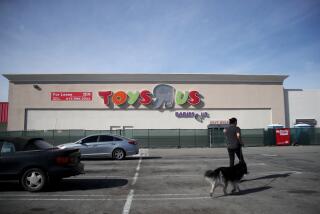MGM-Pathe’s Rocky Start Aggravated by Managerial Confusion, Lack of Money
- Share via
MGM-Pathe Communications Co. is struggling with a cash shortage and management disarray less than four months after the studio was created in a $1.3-billion merger, according to people involved with the company’s affairs.
While studio Co-Chairmen Giancarlo Parretti and Florio Fiorini have spent the last two months trying to raise operating funds in Europe, MGM-Pathe officers here continue to wrestle with unpaid bills and a till that appears virtually empty.
The Hollywood Reporter, an entertainment industry trade paper, reported Tuesday that MGM-Pathe had taken the severe step of delaying the release of its next film, “Delirious,” starring John Candy, because it could not come up with about $7 million for prints and advertising.
MGM-Pathe spokesman Craig Parsons confirmed that the film, which had been scheduled for release on March 8, was delayed. But Parsons declined to say whether the studio lacked funds to release the movie or about 10 others that are similarly completed and awaiting release. “If money was an issue, it wasn’t the only issue,” Parsons said of “Delirious.”
Parsons also confirmed that MGM-Pathe President and Chief Operating Officer Yoram Globus, the company’s highest-ranking officer after Parretti and Fiorini, has been hospitalized for several days at Cedars-Sinai Medical Center. Parsons said Globus had undergone tests and would be released by the end of the week.
Individuals familiar with MGM-Pathe’s affairs said Globus’ illness had compounded management confusion at the studio, where filmmaking executives have been plagued by uncertainty about the future and an inability to communicate with Parretti.
Several people close to MGM-Pathe said Alan Ladd Jr., a veteran Hollywood executive who heads the company’s film operation, has been disgruntled by the lack of funds and has considered resigning. Ladd, according to one source, was particularly irritated by his inability to reach Parretti for nearly six weeks in January and February. According to that source and others, Ladd has been assured by Parretti within the last week that MGM-Pathe will receive a major cash infusion.
“The money will cure a lot of ills. But seeing is believing,” one person close to Ladd said.
Ladd did not return calls seeking comment. His departure would be a severe blow to MGM-Pathe, whose European-based top officers remain outsiders in the Hollywood community. Parsons declined to discuss the reports that a cash infusion from European banks or other sources was expected soon.
MGM-Pathe was formed when Pathe Communications, controlled by Parretti and Fiorini, purchased MGM/UA Communications Co. from investor Kirk Kerkorian and other shareholders for $1.3 billion last November.
The transaction had been delayed for months by Pathe’s difficulty in raising funds. Immediately after the deal closed Nov. 1, the combined companies trimmed hundreds of jobs and ran into problems when a bond payment was late and checks to several suppliers bounced.
Parsons, the MGM-Pathe spokesman, has repeatedly said the company is making good on the checks. Apparently, however, some suppliers have yet to be paid.
A spokesman for Hauppauge Video Manufacturing, a Long Island videocassette firm that claims to be owed $2 million for cassettes supplied to MGM before Pathe purchased the company, said his company was still waiting to see if MGM-Pathe would uphold an agreed plan of payment. “If it materializes, I’ll be happy. If it doesn’t, I don’t know what we can do about it,” the spokesman said of the overdue cash.
Since the merger, MGM-Pathe has been stung by the disappointing performance of four films: “Quigley Down Under,” “Rocky V,” “The Russia House” and “Not Without My Daughter.”
Lou Kerner, a film consultant with Los Angeles-based Kerner & Associates, estimates that “Rocky V” cost about $45 million to produce and may lose as much as $10 million. The movie took in about $40 million in U.S. theaters, but the studio receives less than half of that amount, while theater owners and others receive the rest.
Parretti suffered a setback in Europe last month, when a Naples appeals court upheld his three-year, 10-month sentence for fraudulent bankruptcy, according to a London newspaper report. Under Italian law, he may appeal the sentence in at least two additional courts, a process that may take years.
The investor will return to the United States by Feb. 28, when he will be honored at a testimonial dinner sponsored by the National Council on the Aging.
A spokesman for Kerkorian denied a part of the Hollywood Reporter’s story that said the investor has been buying MGM’s junk bonds at depressed prices in a possible attempt to regain control of the studio in the event of a default. According to the spokesman, neither Kerkorian nor his private holding company, Tracinda, has purchased or intends to purchase any of the bonds, which have a face value of $400 million but have traded much lower as MGM-Pathe’s credit quality declined.
The spokesman said a charitable foundation established by Kerkorian has purchased about $5 million of the bonds but didn’t intend to purchase more.
Pathe is expected soon to file a proxy statement with the Securities and Exchange Commission before a special shareholders meeting to approve terms under which affiliates of Parretti and Fiorini agreed to buy new company shares for $570 million. The SEC reviewed a draft of the statement about a week ago, but returned it with a request for more information, an individual familiar with the filing said. The investors have never publicly described the exact source of their acquisition funds.
More to Read
The biggest entertainment stories
Get our big stories about Hollywood, film, television, music, arts, culture and more right in your inbox as soon as they publish.
You may occasionally receive promotional content from the Los Angeles Times.










